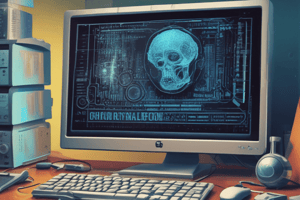Podcast
Questions and Answers
What is the primary goal of digital forensics?
What is the primary goal of digital forensics?
- To develop digital forensics tools
- To analyze and examine digital evidence (correct)
- To prevent cyber attacks
- To design systems with forensic needs in mind
What is the significance of understanding computer components in digital forensics?
What is the significance of understanding computer components in digital forensics?
- To determine the type of digital forensic evidence
- To understand the operating system architecture
- To identify the source of digital evidence
- To understand the hardware and software interaction (correct)
What is the primary role of a digital forensic investigator?
What is the primary role of a digital forensic investigator?
- To develop digital forensics tools
- To prevent cyber attacks
- To design systems with forensic needs in mind
- To collect and analyze digital evidence (correct)
What is the significance of understanding IP address classes in digital forensics?
What is the significance of understanding IP address classes in digital forensics?
What is the primary goal of evidence handling and processing in digital forensics?
What is the primary goal of evidence handling and processing in digital forensics?
What is the significance of Understanding File Systems in digital forensics?
What is the significance of Understanding File Systems in digital forensics?
What is the primary goal of antiforensics?
What is the primary goal of antiforensics?
What is the significance of understanding network topology in digital forensics?
What is the significance of understanding network topology in digital forensics?
What is the main objective of the phases of digital forensics?
What is the main objective of the phases of digital forensics?
What is the primary concern of System Software in digital forensics?
What is the primary concern of System Software in digital forensics?
Which type of digital forensics is concerned with the examination of computers and their associated storage media?
Which type of digital forensics is concerned with the examination of computers and their associated storage media?
What is the primary goal of Jurisdictions in digital forensics?
What is the primary goal of Jurisdictions in digital forensics?
What is the primary function of a digital forensic tool?
What is the primary function of a digital forensic tool?
What is the primary concern of Antiforensics in digital forensics?
What is the primary concern of Antiforensics in digital forensics?
What is the primary goal of the Rules of Evidence in digital forensics?
What is the primary goal of the Rules of Evidence in digital forensics?
What is the primary function of a Digital Forensic Investigator?
What is the primary function of a Digital Forensic Investigator?
Flashcards are hidden until you start studying
Study Notes
Overview of Computer Forensics Course
- Course is divided into five units, each covering a specific aspect of computer forensics
- Total duration of the course is 45 hours
UNIT-I: Introduction to Computer Forensics
- Computer forensics needs and fundamentals
- Steps involved in digital forensics
- Types of computer crimes
- Types of digital forensics evidence
- Legal aspects of digital forensics
UNIT-II: Hardware and Software
- Understanding computer components: input and output devices, CPU
- Digital media and system software: operating system architecture
- Application software and file systems
- Memory organization and data storage concepts
- Network fundamentals: topology, devices, protocols, and ports
- Communication media and IP addresses: types and classes
UNIT-III: Foundations of Digital Forensics
- Basic principles and methodologies for digital forensics
- Designing systems with forensic needs in mind
- Phases of digital forensics
- Introduction to digital forensics tools
- Life cycle of a digital forensic investigator
- Data acquisition: principles and evidence handling
- Processing digital forensic data
UNIT-IV: Evidence Collection and Analysis
- Rules of evidence and jurisdictions
- Techniques and standards for preserving data
- Evidence analysis:
- OS/file system forensics
- Application forensics
- Web forensics
- Network forensics
- Mobile device forensics
UNIT-V: Investigation and Case Studies
- Computer, network, and system attacks
- Attack detection and investigation
- Antiforensics
- Case studies on:
- File system forensics
- Network storage forensics
- Web forensics
- Mobile forensics
Overview of Computer Forensics Course
- Course is divided into five units, each covering a specific aspect of computer forensics
- Total duration of the course is 45 hours
UNIT-I: Introduction to Computer Forensics
- Computer forensics needs and fundamentals
- Steps involved in digital forensics
- Types of computer crimes
- Types of digital forensics evidence
- Legal aspects of digital forensics
UNIT-II: Hardware and Software
- Understanding computer components: input and output devices, CPU
- Digital media and system software: operating system architecture
- Application software and file systems
- Memory organization and data storage concepts
- Network fundamentals: topology, devices, protocols, and ports
- Communication media and IP addresses: types and classes
UNIT-III: Foundations of Digital Forensics
- Basic principles and methodologies for digital forensics
- Designing systems with forensic needs in mind
- Phases of digital forensics
- Introduction to digital forensics tools
- Life cycle of a digital forensic investigator
- Data acquisition: principles and evidence handling
- Processing digital forensic data
UNIT-IV: Evidence Collection and Analysis
- Rules of evidence and jurisdictions
- Techniques and standards for preserving data
- Evidence analysis:
- OS/file system forensics
- Application forensics
- Web forensics
- Network forensics
- Mobile device forensics
UNIT-V: Investigation and Case Studies
- Computer, network, and system attacks
- Attack detection and investigation
- Antiforensics
- Case studies on:
- File system forensics
- Network storage forensics
- Web forensics
- Mobile forensics
Studying That Suits You
Use AI to generate personalized quizzes and flashcards to suit your learning preferences.




